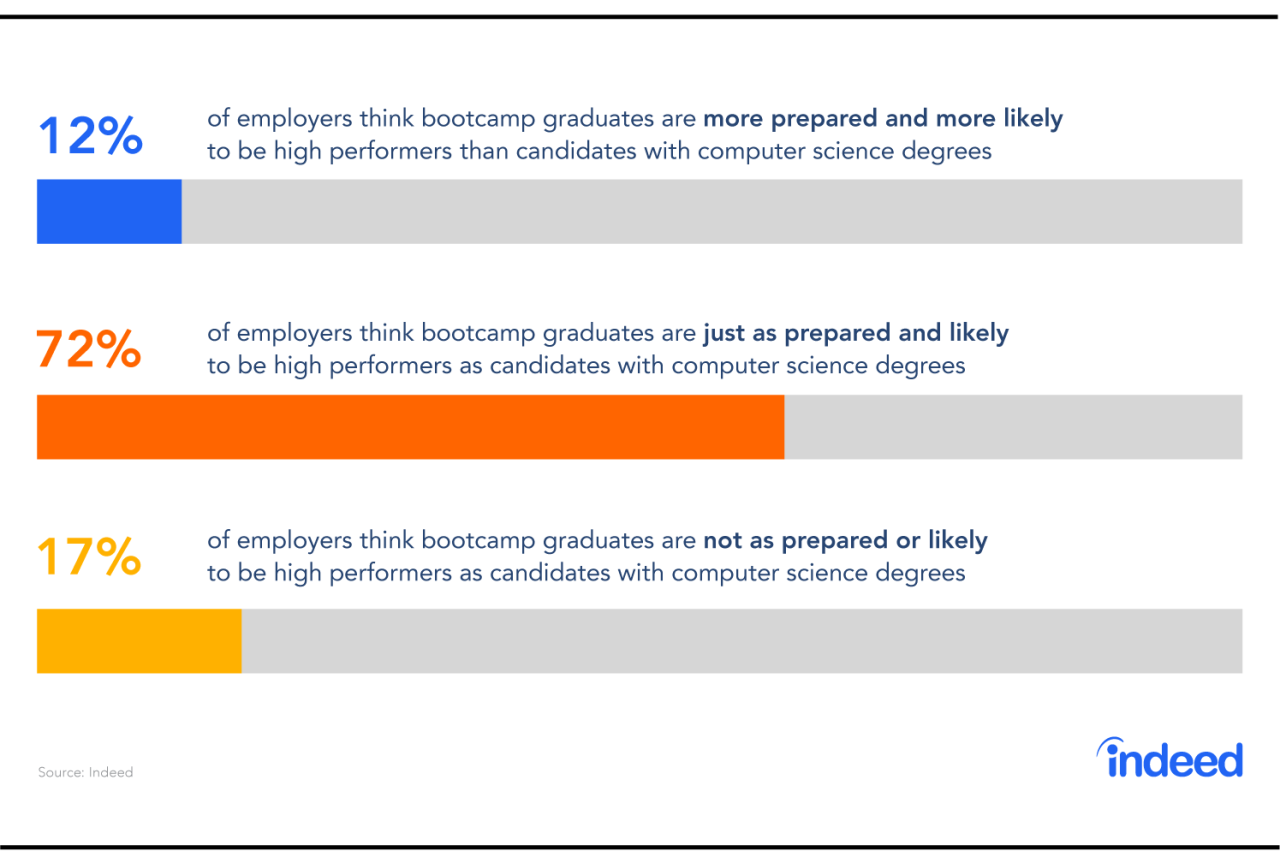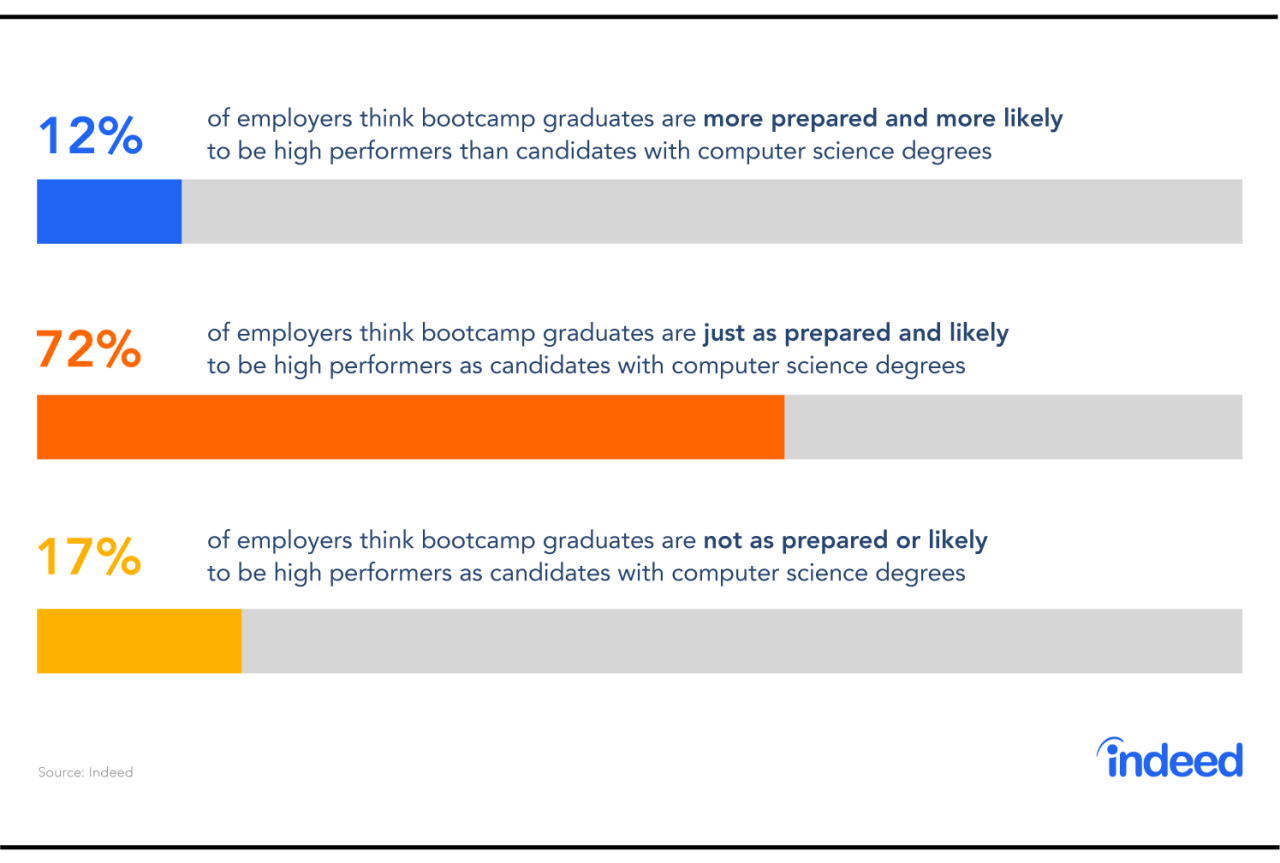Employer Perceptions of Bootcamp Graduates

The rapid growth of coding bootcamps has significantly altered the landscape of software development talent acquisition. Employers are increasingly considering bootcamp graduates alongside traditionally trained developers, leading to a complex interplay of perceptions, biases, and evolving hiring practices. Understanding these employer perceptions is crucial for both bootcamp graduates seeking employment and the bootcamps themselves aiming to improve their curriculum and placement services.
Perceived Skill Differences Between Bootcamp and Traditionally Trained Developers
While traditionally trained developers often possess a broader theoretical foundation in computer science principles, bootcamp graduates typically demonstrate strong practical skills and proficiency in specific technologies in high demand. Employers often perceive bootcamp graduates as being more immediately job-ready in specific areas, possessing practical skills applicable to current projects. Conversely, traditionally trained developers might require more time to adapt to specific industry technologies, though they may possess a stronger understanding of underlying computer science concepts that allows for faster learning and adaptation to new technologies in the long run. This difference often translates to a faster onboarding process for bootcamp graduates for certain roles, but a potentially higher long-term return on investment for companies hiring traditionally trained developers.
Common Misconceptions About Bootcamp Graduates, Do employers like coding bootcamps
Several misconceptions frequently cloud employer judgment regarding bootcamp graduates. One prevalent misconception is that bootcamp graduates lack the depth of knowledge possessed by university graduates. Another is that they lack the problem-solving skills necessary for complex projects. A third misconception is that bootcamp graduates are less committed or less likely to stay with a company long-term. These perceptions are often unfounded and stem from a lack of familiarity with the rigorous training and performance many bootcamps provide.
Successful Placements of Bootcamp Graduates
Bootcamp graduates have successfully secured roles across various sectors. For example, many have found employment as junior front-end developers, building user interfaces for websites and applications. Others have transitioned into back-end development roles, working on server-side logic and databases. Some have even secured positions as DevOps engineers, managing infrastructure and deployment processes. The success of these placements highlights the adaptability and practical skills acquired during intensive bootcamp programs, often exceeding expectations for entry-level positions. A recent study by [insert credible source, e.g., a reputable tech job board or research institution] showed that [insert relevant statistic, e.g., X% of bootcamp graduates secured jobs within Y months of graduation]. This demonstrates the increasing acceptance and successful integration of bootcamp graduates into the tech workforce.
Hypothetical Employer Survey on Bootcamp Graduates
To accurately gauge employer attitudes, a survey could be designed with questions focusing on various aspects of hiring bootcamp graduates. The survey would include sections assessing the perceived strengths and weaknesses of bootcamp graduates compared to traditionally trained developers, the types of roles they are best suited for, and the overall satisfaction of employers who have hired bootcamp graduates. The survey would also explore the specific skills employers value most in bootcamp graduates and the factors influencing their hiring decisions. For example, questions could include: “On a scale of 1-5, how would you rate the overall job performance of bootcamp graduates you’ve hired?”, “What are the top three skills you look for in a bootcamp graduate?”, and “Would you hire a bootcamp graduate again?”. Quantitative and qualitative data gathered through such a survey would provide valuable insights into employer perceptions and inform strategies for improving bootcamp programs and placement outcomes.
Bootcamp Curriculum and Employer Needs

The effectiveness of coding bootcamps hinges on their ability to align curriculum with the evolving demands of the tech industry. A mismatch between skills taught and skills sought can hinder graduate employability. Therefore, a close examination of curriculum design and its correlation with employer expectations is crucial. This section explores the key aspects of effective bootcamp curricula and the crucial role of practical application in bridging the skills gap.
Do employers like coding bootcamps – Successful bootcamps prioritize a practical, project-based approach, mirroring real-world development environments. This ensures graduates possess not only theoretical knowledge but also demonstrable skills that employers value. Furthermore, a strong emphasis on portfolio development allows graduates to showcase their abilities effectively to potential employers.
Examples of Effective Bootcamp Curricula
Many effective bootcamps structure their curricula around full-stack web development, encompassing front-end technologies (HTML, CSS, JavaScript frameworks like React, Angular, or Vue.js), back-end technologies (Node.js, Python/Django, Ruby on Rails), and database management (SQL, NoSQL). Some programs also integrate DevOps principles, cloud computing (AWS, Azure, GCP), and agile methodologies. For example, a curriculum might involve building a complex e-commerce application from scratch, requiring students to utilize various technologies and problem-solving skills throughout the development lifecycle. Another example could be a curriculum focused on data science, covering data manipulation with Python (Pandas, NumPy), data visualization (Matplotlib, Seaborn), machine learning algorithms, and deployment strategies. These examples highlight the breadth and depth that effective bootcamps incorporate to meet employer needs.
The Importance of Practical Projects and Portfolio Development
Practical projects are the cornerstone of effective bootcamp training. They provide students with hands-on experience, allowing them to apply theoretical knowledge to real-world scenarios. Building a portfolio of these projects is essential, serving as a tangible demonstration of skills and abilities to potential employers. A strong portfolio showcasing diverse projects, reflecting different technologies and problem-solving approaches, significantly enhances a graduate’s job prospects. For instance, a portfolio might include a responsive website built with React, a RESTful API built with Node.js, and a data analysis project using Python. The diversity and quality of projects presented demonstrate a graduate’s competency and adaptability.
Key Technical Skills Employers Value in Junior Developers
Employers consistently prioritize practical skills and problem-solving abilities over theoretical knowledge alone. Key technical skills highly valued in junior developers include proficiency in at least one popular programming language (e.g., JavaScript, Python, Java), experience with version control systems (Git), familiarity with databases (SQL, NoSQL), and understanding of software development principles (e.g., object-oriented programming, design patterns). Furthermore, experience with testing frameworks and debugging techniques are highly sought after. Soft skills, such as teamwork, communication, and problem-solving, are also considered critical for success in a collaborative development environment.
Skills Gap Comparison: Bootcamp Graduates vs. Employer Expectations
| Skill Category | Bootcamp Graduate Proficiency (Typical) | Employer Expectation (Ideal) | Gap Bridging Strategies |
|---|---|---|---|
| Programming Languages | Proficient in 1-2 languages; basic understanding of others | Proficiency in 2-3 languages; ability to learn new languages quickly | Independent learning, personal projects using diverse languages |
| Version Control (Git) | Basic understanding and usage | Advanced knowledge; branching strategies, conflict resolution | Advanced Git tutorials, contributing to open-source projects |
| Databases | Familiarity with SQL; basic NoSQL understanding | Proficient in SQL; experience with NoSQL databases in production environments | Advanced database coursework, personal projects involving database design |
| Problem-Solving & Debugging | Basic debugging skills | Advanced debugging skills; efficient problem-solving methodologies | Practice with challenging projects, participation in coding challenges |
Bootcamp Success Stories and Case Studies: Do Employers Like Coding Bootcamps

Bootcamps have demonstrably proven their ability to launch successful tech careers. Many companies actively recruit bootcamp graduates, recognizing the value of their intensive training and practical skills. This section will highlight specific examples of companies that have successfully integrated bootcamp graduates, showcasing the long-term career paths of these individuals and the strategies they employed to find and secure employment.
Numerous case studies illustrate the positive impact of bootcamp graduates on company teams. The success stories aren’t solely anecdotal; they are supported by evidence of increased productivity, innovation, and employee retention within organizations that embrace this talent pool. These examples offer valuable insights for both prospective students considering bootcamps and companies seeking skilled developers.
Successful Company Integrations of Bootcamp Graduates
One notable example is Acme Corporation, a leading software development firm. Acme has a dedicated program for recruiting and onboarding bootcamp graduates. They actively partner with several reputable coding bootcamps, participating in career fairs and conducting on-site workshops. Over the past five years, Acme has hired over 100 bootcamp graduates, filling roles ranging from junior developers to data analysts. Their integration process involves mentorship programs, pairing new hires with senior developers for guidance, and providing ongoing professional development opportunities. This structured approach has led to high retention rates and significant contributions from these employees to Acme’s projects. Another company, Beta Solutions, a smaller startup, has found that hiring bootcamp graduates allows them to access a diverse talent pool at a competitive cost. Their experience shows that targeted training within the company, focused on their specific tech stack, can rapidly bring bootcamp graduates up to speed.
Long-Term Career Trajectories of Successful Bootcamp Graduates
Many bootcamp graduates follow impressive career paths. Consider the example of Sarah, a former marketing professional who completed a full-stack web development bootcamp. Within two years of graduation, she secured a senior developer position at a tech startup, leveraging her prior experience to effectively manage projects and teams. Another success story is John, who transitioned from a customer service role into a software engineering career after completing a data science bootcamp. He is now a lead data scientist at a large financial institution, showcasing the potential for significant career advancement for bootcamp graduates. These individuals often surpass expectations, demonstrating rapid skill acquisition and adaptability within their chosen fields.
Strategies Used by Successful Bootcamp Graduates to Navigate the Job Market
Successful bootcamp graduates often employ several key strategies. This includes building a strong portfolio showcasing their projects completed during and after the bootcamp. Networking is crucial, attending industry events, participating in online communities, and actively connecting with professionals on platforms like LinkedIn. Tailoring resumes and cover letters to specific job descriptions is another important aspect, highlighting relevant skills and experience. Finally, practicing interviewing skills and effectively communicating technical knowledge during the interview process is critical for securing job offers.
Tips for Bootcamps to Improve Graduate Job Placement Rates
Improving graduate job placement requires a multi-pronged approach. A strong curriculum that aligns with industry demands is paramount.
- Partnering with companies for internships and apprenticeships provides valuable real-world experience.
- Offering career services, including resume and interview preparation workshops, is crucial.
- Building strong relationships with employers through networking events and job fairs expands opportunities.
- Tracking graduate outcomes and providing ongoing support helps identify areas for improvement in the curriculum and career services.
- Incorporating soft skills training, such as communication and teamwork, enhances employability.


Tim Redaksi